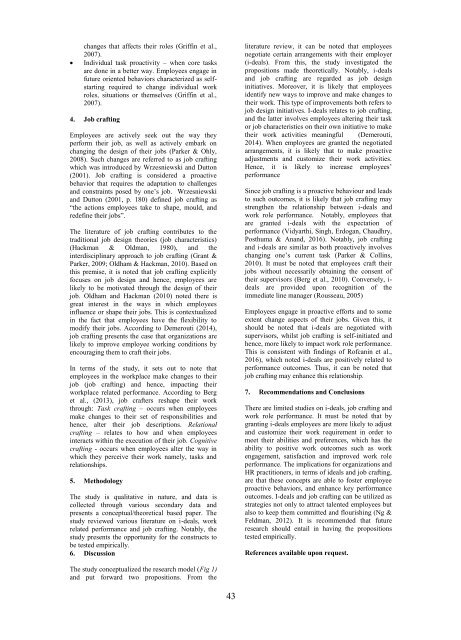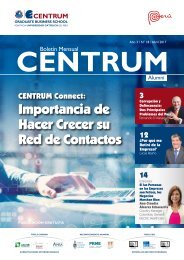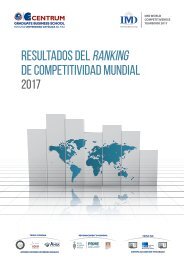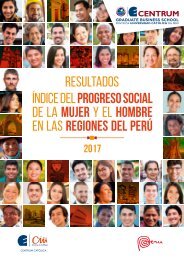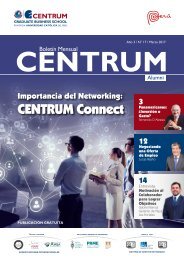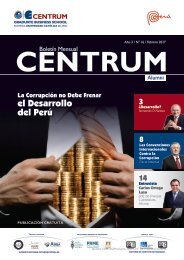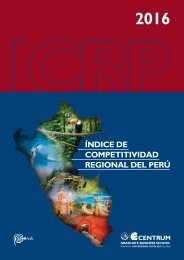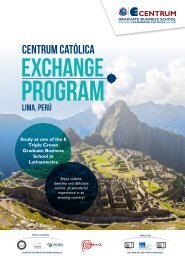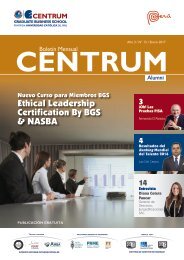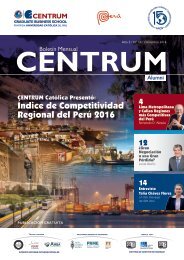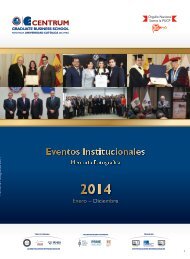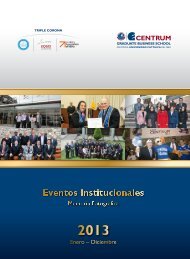Pan-Pacific Conference XXXIV. Designing New Business Models in Developing Economies
This publication represents the Proceedings of the 34th Annual Pan-Pacific Conference being held in Lima, Peru May 29-31, 2017. The Pan-Pacific Conference has served as an important forum for the exchange of ideas and information for promoting understanding and cooperation among the peoples of the world since 1984. Last year, we had a memorable conference in Miri, Malaysia, in cooperation with Curtin University Sarawak, under the theme of “Building a Smart Society through Innovation and Co-creation.” Professor Pauline Ho served as Chair of the Local Organizing Committee, with strong leadership support of Pro Vice-Chancellor Professor Jim Mienczakowski and Dean Jonathan Winterton.
This publication represents the Proceedings of the 34th Annual Pan-Pacific Conference being held in Lima, Peru May 29-31, 2017. The Pan-Pacific Conference has served as an important forum for the exchange of ideas and information for promoting understanding and cooperation among the peoples of the world since 1984. Last year, we had a memorable conference in Miri, Malaysia, in cooperation with Curtin University Sarawak, under the theme of “Building a Smart Society through Innovation and Co-creation.” Professor Pauline Ho served as Chair of the Local Organizing Committee, with strong leadership support of Pro Vice-Chancellor Professor Jim Mienczakowski and Dean Jonathan Winterton.
You also want an ePaper? Increase the reach of your titles
YUMPU automatically turns print PDFs into web optimized ePapers that Google loves.
changes that affects their roles (Griff<strong>in</strong> et al.,<br />
2007).<br />
Individual task proactivity – when core tasks<br />
are done <strong>in</strong> a better way. Employees engage <strong>in</strong><br />
future oriented behaviors characterized as selfstart<strong>in</strong>g<br />
required to change <strong>in</strong>dividual work<br />
roles, situations or themselves (Griff<strong>in</strong> et al.,<br />
2007).<br />
4. Job craft<strong>in</strong>g<br />
Employees are actively seek out the way they<br />
perform their job, as well as actively embark on<br />
chang<strong>in</strong>g the design of their jobs (Parker & Ohly,<br />
2008). Such changes are referred to as job craft<strong>in</strong>g<br />
which was <strong>in</strong>troduced by Wrzesniewski and Dutton<br />
(2001). Job craft<strong>in</strong>g is considered a proactive<br />
behavior that requires the adaptation to challenges<br />
and constra<strong>in</strong>ts posed by one’s job. Wrzesniewski<br />
and Dutton (2001, p. 180) def<strong>in</strong>ed job craft<strong>in</strong>g as<br />
“the actions employees take to shape, mould, and<br />
redef<strong>in</strong>e their jobs”.<br />
The literature of job craft<strong>in</strong>g contributes to the<br />
traditional job design theories (job characteristics)<br />
(Hackman & Oldman, 1980), and the<br />
<strong>in</strong>terdiscipl<strong>in</strong>ary approach to job craft<strong>in</strong>g (Grant &<br />
Parker, 2009; Oldham & Hackman, 2010). Based on<br />
this premise, it is noted that job craft<strong>in</strong>g explicitly<br />
focuses on job design and hence, employees are<br />
likely to be motivated through the design of their<br />
job. Oldham and Hackman (2010) noted there is<br />
great <strong>in</strong>terest <strong>in</strong> the ways <strong>in</strong> which employees<br />
<strong>in</strong>fluence or shape their jobs. This is contextualized<br />
<strong>in</strong> the fact that employees have the flexibility to<br />
modify their jobs. Accord<strong>in</strong>g to Demerouti (2014),<br />
job craft<strong>in</strong>g presents the case that organizations are<br />
likely to improve employee work<strong>in</strong>g conditions by<br />
encourag<strong>in</strong>g them to craft their jobs.<br />
In terms of the study, it sets out to note that<br />
employees <strong>in</strong> the workplace make changes to their<br />
job (job craft<strong>in</strong>g) and hence, impact<strong>in</strong>g their<br />
workplace related performance. Accord<strong>in</strong>g to Berg<br />
et al., (2013), job crafters reshape their work<br />
through: Task craft<strong>in</strong>g – occurs when employees<br />
make changes to their set of responsibilities and<br />
hence, alter their job descriptions. Relational<br />
craft<strong>in</strong>g – relates to how and when employees<br />
<strong>in</strong>teracts with<strong>in</strong> the execution of their job. Cognitive<br />
craft<strong>in</strong>g - occurs when employees alter the way <strong>in</strong><br />
which they perceive their work namely, tasks and<br />
relationships.<br />
5. Methodology<br />
The study is qualitative <strong>in</strong> nature, and data is<br />
collected through various secondary data and<br />
presents a conceptual/theoretical based paper. The<br />
study reviewed various literature on i-deals, work<br />
related performance and job craft<strong>in</strong>g. Notably, the<br />
study presents the opportunity for the constructs to<br />
be tested empirically.<br />
6. Discussion<br />
literature review, it can be noted that employees<br />
negotiate certa<strong>in</strong> arrangements with their employer<br />
(i-deals). From this, the study <strong>in</strong>vestigated the<br />
propositions made theoretically. Notably, i-deals<br />
and job craft<strong>in</strong>g are regarded as job design<br />
<strong>in</strong>itiatives. Moreover, it is likely that employees<br />
identify new ways to improve and make changes to<br />
their work. This type of improvements both refers to<br />
job design <strong>in</strong>itiatives. I-deals relates to job craft<strong>in</strong>g,<br />
and the latter <strong>in</strong>volves employees alter<strong>in</strong>g their task<br />
or job characteristics on their own <strong>in</strong>itiative to make<br />
their work activities mean<strong>in</strong>gful (Demerouti,<br />
2014). When employees are granted the negotiated<br />
arrangements, it is likely that to make proactive<br />
adjustments and customize their work activities.<br />
Hence, it is likely to <strong>in</strong>crease employees’<br />
performance<br />
S<strong>in</strong>ce job craft<strong>in</strong>g is a proactive behaviour and leads<br />
to such outcomes, it is likely that job craft<strong>in</strong>g may<br />
strengthen the relationship between i-deals and<br />
work role performance. Notably, employees that<br />
are granted i-deals with the expectation of<br />
performance (Vidyarthi, S<strong>in</strong>gh, Erdogan, Chaudhry,<br />
Posthuma & Anand, 2016). Notably, job craft<strong>in</strong>g<br />
and i-deals are similar as both proactively <strong>in</strong>volves<br />
chang<strong>in</strong>g one’s current task (Parker & Coll<strong>in</strong>s,<br />
2010). It must be noted that employees craft their<br />
jobs without necessarily obta<strong>in</strong><strong>in</strong>g the consent of<br />
their supervisors (Berg et al., 2010). Conversely, i-<br />
deals are provided upon recognition of the<br />
immediate l<strong>in</strong>e manager (Rousseau, 2005)<br />
Employees engage <strong>in</strong> proactive efforts and to some<br />
extent change aspects of their jobs. Given this, it<br />
should be noted that i-deals are negotiated with<br />
supervisors, whilst job craft<strong>in</strong>g is self-<strong>in</strong>itiated and<br />
hence, more likely to impact work role performance.<br />
This is consistent with f<strong>in</strong>d<strong>in</strong>gs of Rofcan<strong>in</strong> et al.,<br />
2016), which noted i-deals are positively related to<br />
performance outcomes. Thus, it can be noted that<br />
job craft<strong>in</strong>g may enhance this relationship.<br />
7. Recommendations and Conclusions<br />
There are limited studies on i-deals, job craft<strong>in</strong>g and<br />
work role performance. It must be noted that by<br />
grant<strong>in</strong>g i-deals employees are more likely to adjust<br />
and customize their work requirement <strong>in</strong> order to<br />
meet their abilities and preferences, which has the<br />
ability to positive work outcomes such as work<br />
engagement, satisfaction and improved work role<br />
performance. The implications for organizations and<br />
HR practitioners, <strong>in</strong> terms of ideals and job craft<strong>in</strong>g,<br />
are that these concepts are able to foster employee<br />
proactive behaviors, and enhance key performance<br />
outcomes. I-deals and job craft<strong>in</strong>g can be utilized as<br />
strategies not only to attract talented employees but<br />
also to keep them committed and flourish<strong>in</strong>g (Ng &<br />
Feldman, 2012). It is recommended that future<br />
research should entail <strong>in</strong> hav<strong>in</strong>g the propositions<br />
tested empirically.<br />
References available upon request.<br />
The study conceptualized the research model (Fig 1)<br />
and put forward two propositions. From the<br />
43


